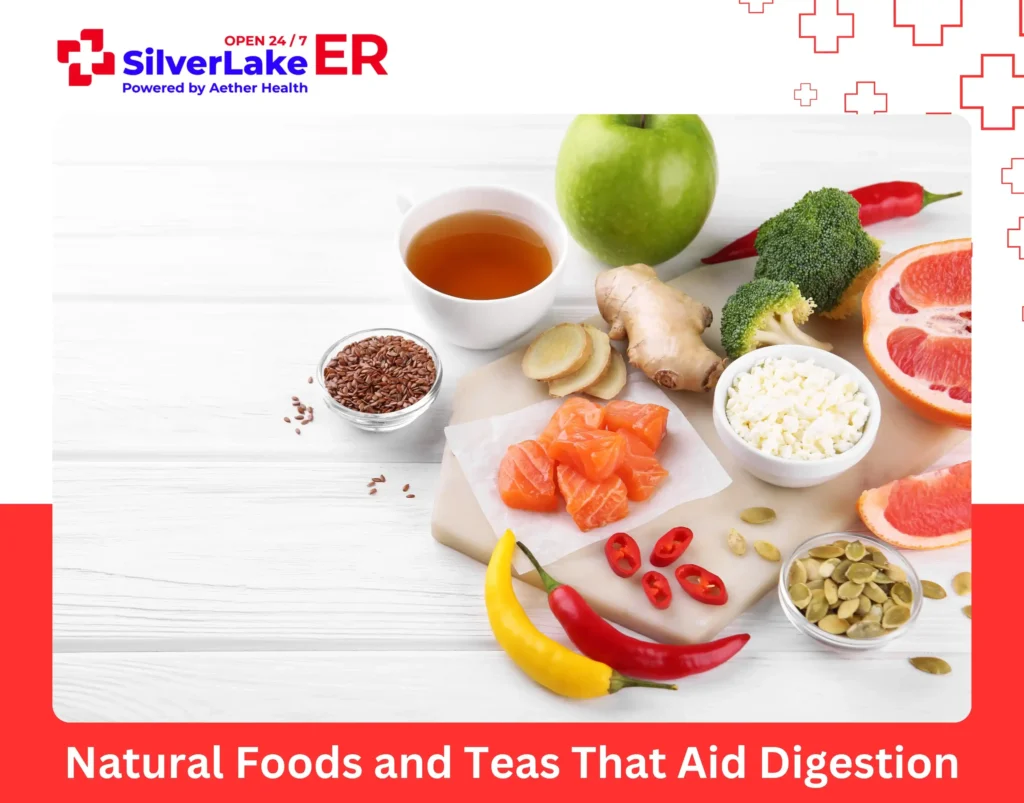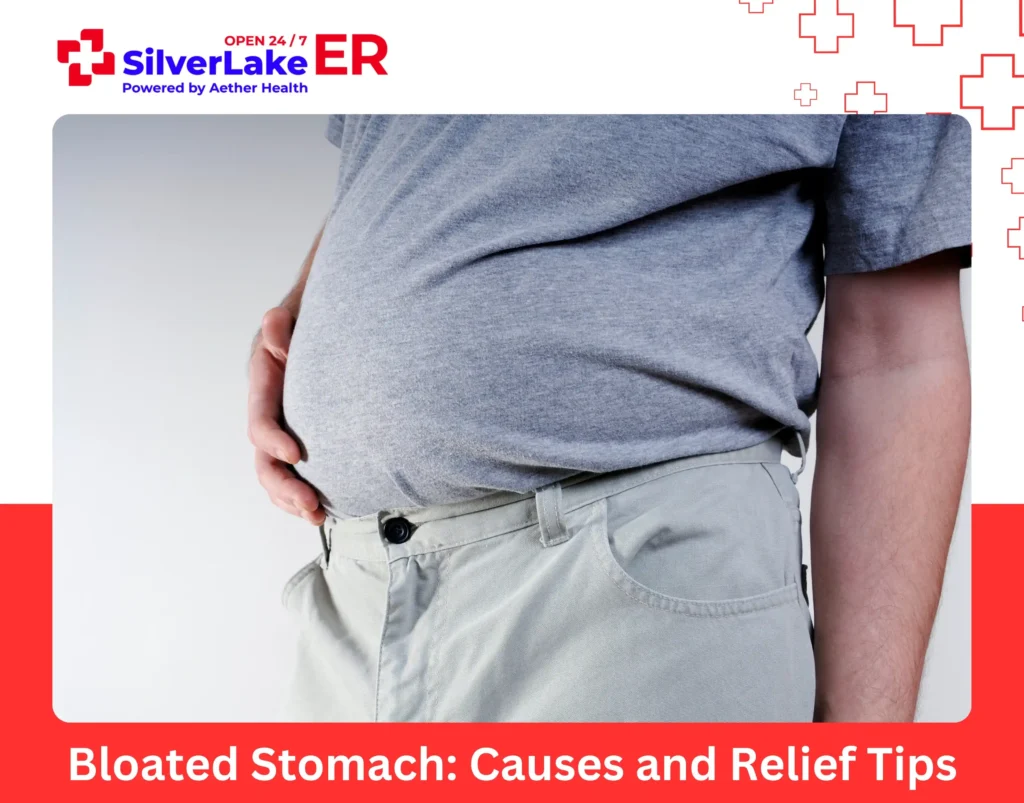Does your stomach sometimes feel swollen, tight, or uncomfortable without a clear reason? Bloating can be an uneasy and worrying experience, appearing after certain meals for some or randomly for others.
Occasional bloating is normal, but if it persists, it’s essential to understand what triggers it. Causes of bloated stomach range from dietary habits to digestive conditions needing attention.
At Silverlake ER, we often meet patients who assume their bloating is caused by gas, only to discover a more complex underlying cause. Let’s understand the common causes and know when to seek help for a bloated stomach.
Common Causes of a Bloated Stomach

A bloated stomach can result from eating habits or may indicate a digestive issue or another underlying condition. Understanding the triggers helps determine whether lifestyle changes are sufficient or if medical advice is needed.
1. Dietary causes
Diet is the most common cause of bloating. Eating large meals, consuming salty foods, or drinking carbonated beverages can cause bloating by trapping air. Even chewing gum can lead to swallowing more air and discomfort.
2. Gas and indigestion
When food doesn’t move smoothly through digestion, gas builds up in the intestines. Constipation, slow digestion, or eating too fast can trap gas, making your stomach feel hard and bloated.
3. Food intolerances and sensitivities
Certain foods don’t suit everyone. Lactose intolerance, gluten sensitivity, or sensitivity to FODMAPs (such as onions, beans, apples) can trigger bloating and discomfort. If bloating occurs after specific meals, food sensitivities may be the cause.
4. Irritable Bowel Syndrome (IBS)
IBS is a common digestive disorder that often causes bloating, gas, and abdominal pain. For people living with IBS, bloating tends to come and go, and is usually worse after meals. Managing diet, stress, and lifestyle can be beneficial, but medical guidance is often necessary for optimal results.
5. Hormonal changes
For many women, bloating is normal during the menstrual cycle. Hormonal changes, especially around menstruation, can cause water retention and digestive changes, temporarily swelling the stomach.
6. Medical conditions (less common but serious)
Sometimes, bloating signals a medical condition. Gallstones, liver disease, ovarian cysts, or bowel obstruction can all cause swelling. Though rarer, these need prompt medical attention.
When to Worry About Bloating: Warning Signs
Most bloating is mild and typically linked to diet or digestive issues. However, sometimes bloating points to a more serious issue. Seek medical attention if you experience:
- Severe, sudden bloating with pain
- Fever, vomiting, or blood in stool
- Rapid abdominal swelling
- Unexplained weight loss
- Shortness of breath with bloating
These warning signs may indicate an emergency and require urgent care at an ER.
Relief Tips for Everyday Bloating

Not all bloating means something serious. If your symptoms are mild, you can often feel better by trying specific approaches.
- Eat smaller meals more frequently, rather than large portions at a time. Large meals can stretch your stomach and worsen bloating.
- Choose still water or non-carbonated drinks instead of fizzy sodas or sparkling water to avoid excess gas.
- Reduce your intake of high-sodium foods, such as processed snacks and canned soups, as they can cause water retention and exacerbate bloating.
- Take a brief walk or engage in light movement after eating to help your digestion and allow trapped gas to pass through your system.
- Keep a food diary to track which items, such as dairy, gluten, beans, or artificial sweeteners, cause you to feel bloated, and adjust your diet accordingly.
- Practice stress reduction with deep breathing, meditation, or gentle yoga. These techniques can help prevent stress-related bloating.
- Drink plenty of water throughout the day. Staying hydrated supports digestion and helps prevent constipation that can lead to bloating.
Natural Foods and Teas That Aid Digestion

Simple food choices can help alleviate bloating quickly. Some foods and teas calm digestion, reduce gas, and ease discomfort:
- Ginger – Helps food move through the stomach faster and reduces indigestion.
- Peppermint tea – Relaxes the muscles of the digestive tract, easing gas and cramping.
- Fennel seeds or tea – Known for reducing bloating and calming intestinal spasms.
- Chamomile tea – Gentle on the stomach and helps with both digestion and stress-related bloating.
- Bananas – A natural source of potassium, which balances sodium levels and reduces water retention.
- Pineapple – Contains bromelain, an enzyme that helps break down proteins and supports digestion.
- Yogurt with live cultures – Provides probiotics that restore gut bacteria balance.
Conclusion
Most bloating is caused by food, digestion, or lifestyle factors, and typically resolves with simple adjustments to diet and lifestyle. But sudden, severe, or warning sign-related bloating may need urgent care.
Silverlake ER is available 24/7 to evaluate, rule out emergencies, and provide fast relief for abdominal symptoms. Whether your bloating is mild or serious, we ensure you receive the right care when you need it.
Frequently Asked Questions
1. Why does my stomach bloat at night?
Nighttime bloating often occurs because digestion slows later in the day. Eating large dinners, salty foods, or carbonated drinks in the evening can cause gas to accumulate in the digestive system. Lying down soon after eating can worsen bloating.
2. Can stress cause bloating?
Yes, stress affects digestion. Anxiety can slow or spasm your gut, causing gas, indigestion, and bloating. Managing stress with relaxation techniques can help relieve these symptoms.
3. What foods make bloating worse?
Foods that worsen bloating include beans, lentils, onions, broccoli, cabbage, carbonated drinks, and high-sodium meals. For some, dairy or gluten may also be triggers. Keeping a food diary helps identify your triggers.
4. How do I know if my bloating is a serious issue?
Occasional bloating is usually harmless. If symptoms persist, are painful, or accompanied by weight loss, vomiting, blood in stool, or severe swelling, seek medical care immediately.
5. Can bloating be a sign of ovarian cancer?
Yes, in rare cases, persistent bloating that doesn’t improve with lifestyle changes can signal ovarian cancer, especially with pelvic pain, frequent urination, or feeling full quickly. Consult a doctor if you experience any of these symptoms.




